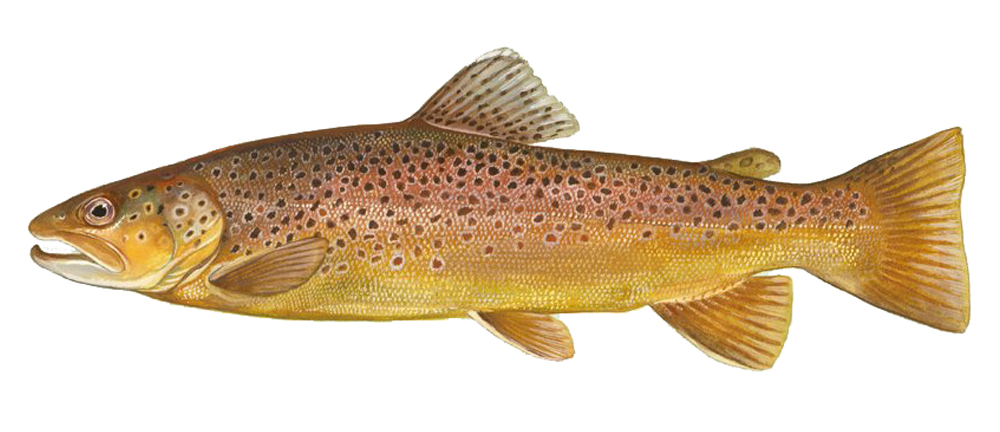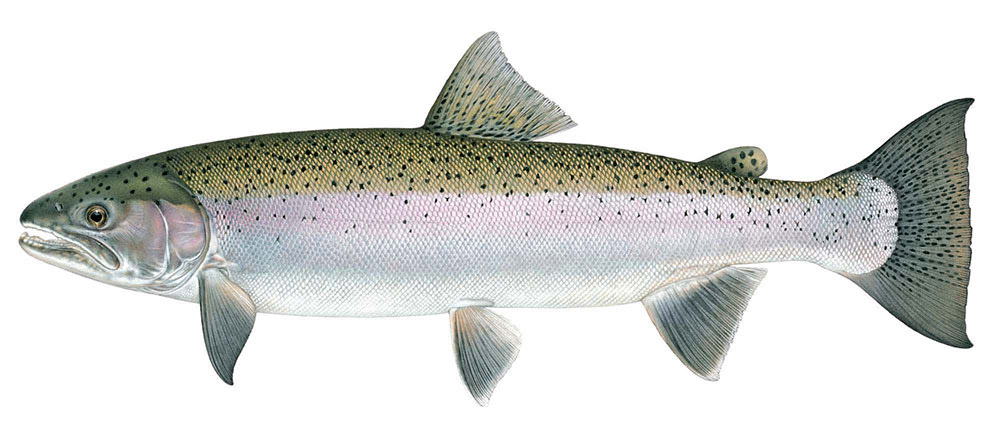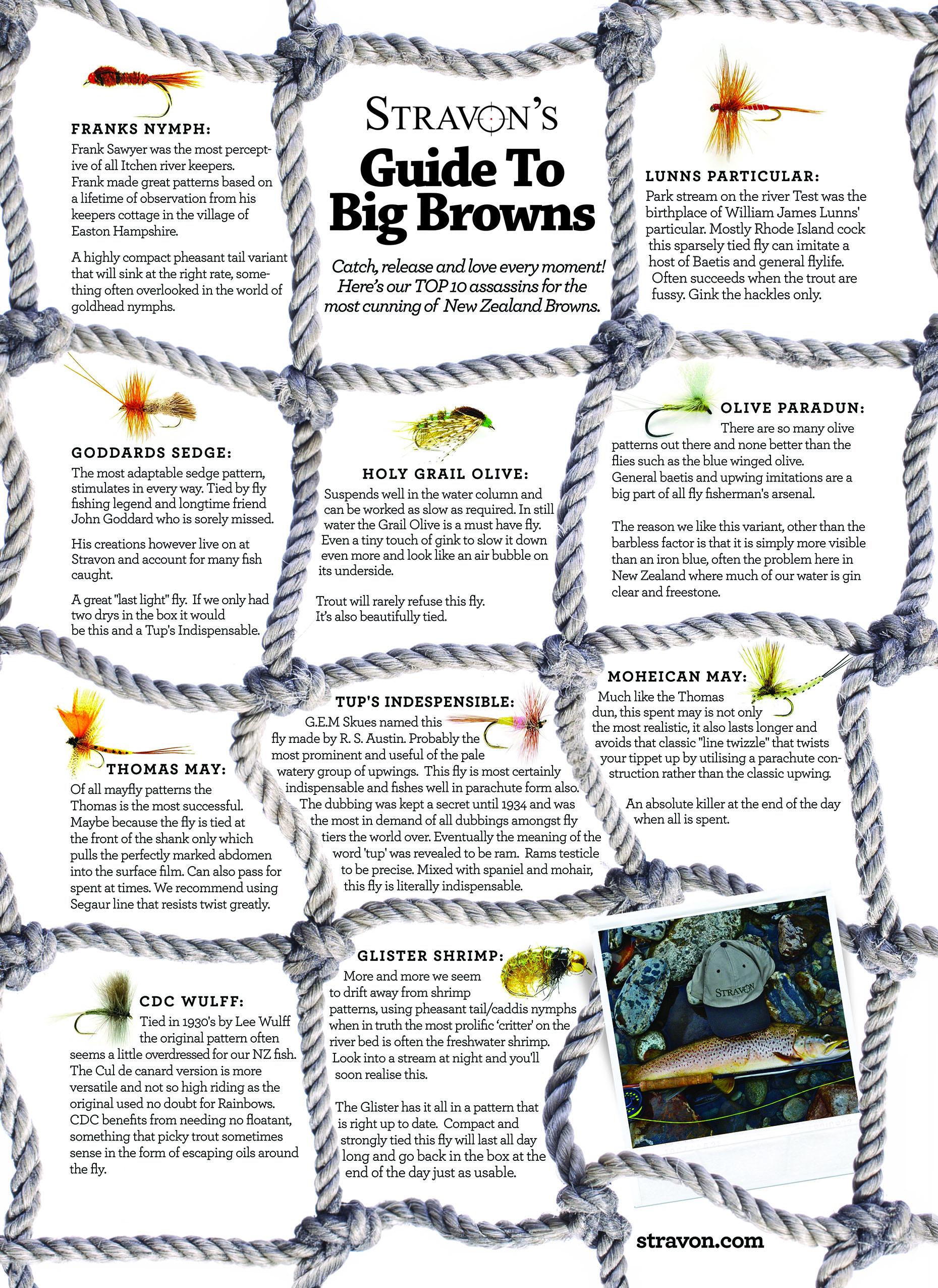Catch, Release & Love Every Moment
-
Brown Trout
+Salmo Trutta
-
Rainbow Trout
+Oncorhynchus mykiss
-
Salmon
+Oncorhynchus tshawytscha
-
ENVIRONMENT
+We take New Zealand’s unique flora and fauna very seriously and have our own Bio-Security requirements in place. This is to ensure that no foreign organisms or threats enter our pristine waterways. Our protection measures include cleaning and freezing equipment to ensure all threats are benign.
OUR GUIDES work exclusively for STRAVON and are expected to have an advanced knowledge of all forms of fly casting, equipment, safety, decorum/etiquette, conservation, entomology, wildlife, habitat and holistic biodiversity in order to better inform guests of the environment and wilderness areas they are traveling to.
-
Season
+October - April
Our fishing season varies somewhat depending on which part of New Zealand you’re in. Stravon Safaris has many key locations throughout the South Island and while we are not going to tell you (as most fisherman can attest) where our spots are, please bear in mind that elements such as river conditions, incoming weather etc do factor into just where we will ‘put you’ on that given day.
Trout in New Zealand behave slightly differently to the norm. Browns seem more territorial and that may well be because of their large average size. Bigger fish need more food and as a result tend to ‘cruise’ on a beat that they endlessly patrol in search of food. One side of a pool may have forest, the other gravel making the average type of food they search for on either side of the pool different. Of course you can make exceptions to this all day long but watching a fish on his beat before casting is paramount.
Spook a small fish you didn’t spot in the tail and all will be alerted to the fact that something’s not right. Fish may stop for a time before resuming their beat, cautiously so. Spooking unseen fish is a common error in approaching a fish that is in a lie also, usually at the start of the day prior to cruising.
Casting at fish in the traditional line behind, tippet and fly above is also a common mistake. These fish will travel to a fly, so your first cast should be well to the side of the fish, a few feet at least. Often this pays off and if it doesn’t the angler has taken the time to gauge line and length, with a low risk of spooking before casting closer. Remember these points when approaching a big New Zealand brown.
Our season starts at the beginning of October on some waters, November 1st on others. In October you may find yourself in near winter conditions whilst only a month later it could seem like late spring/early summer. Systems with snowmelt can be high and coloured, rainfall can make other waters high and cold to cross. Every year is different and the huge diversity of water here makes it near impossible to predict or generalise. One thing is for sure though, after the long closed winter season fish are hungry and well rested.
On our home waters of the Mackenzie Basin, the air is beautifully fresh, surrounded by the mighty Southern Alps, - it's an incredible time to be on the water. As summer arrives so too the rise starts to build. Longer hours of daylight and higher temperatures herald the prolific hatches of Baetis and Sedge. The trout start to look up. Once summer really kicks in the rivers start to drop noticeably improving fish density and spotability. The dry fly rules at this time. Long leaders, double tapers,careful presentation and a good measure of stealth allow us to practice our sport in its purest form. With days as long as this its hard to make it all the way to the evening rise so a siesta or heading out in the afternoon will allow you to be there at 10.30 at night frantically matching the hatch.
We also have an New Zealand equivalent to ‘duffers fortnight’ in the form of the cicada. Trout forget many of their inhibitions, gulping down these prehistoric looking insects with glee. Even better, this continues for far more than a fortnight and can be very welcome at this time when fish have seen a few anglers.
As the season draws the browns start to push on their spawning run. Upper parts of the catchments start to see new fish and this can really stir things up. With so many tributaries its a great time for us to push up also into new water at a time of year that really drives home the natural beauty of this unforgettable island.
The high country closes at the end of April leaving those waters that remain to the hardy winter angler.
“What about the rainbows” we hear you ask.
Well they just smash everything they see.Thank god they’re not big enough to eat us. Yet!
April - October
From the end of April to the beginning of October our high country rivers close for spawning. There are however many exceptions to this closure that include all lakes and connected river mouths upstream for specified distances for each and every river. Any river downstream of the main coastal roads and any system that has in some way been altered by man, as part of, for instance, hydro electric power generation. This allows the angler to focus on a selection of waters without the overwhelming choices available during the full season. However, this still leaves us with incredible amount of water to explore and almost nobody bankside. It can also put you into the path of running fish which can be a welcome change from wary resident fish.
This is often the time that our guides go fishing to unwind and catch a few fish themselves in the glorious mountain air and environs.
*Stravon Safaris holds concessions to land on conservation lands throughout the South Island, providing further fly fishing nirvana.
-
Top 10
+




